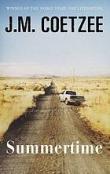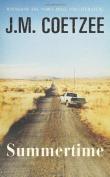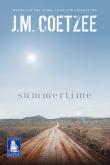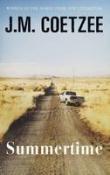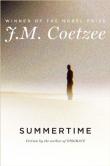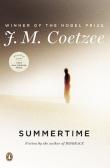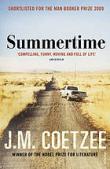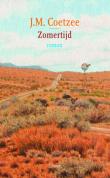AustLit
Latest Issues
AbstractHistoryArchive Description
'A young English biographer is working on a book about the late writer, John Coetzee. He plans to focus on the years from 1972 - 1977 when Coetzee, in his thirties, is sharing a run-down cottage in the suburbs of Cape Town with his widowed father. This, the biographer senses, is the period when he was finding his feet as a writer. Never having met Coetzee, he embarks on a series of interviews with people who were important to him: a married woman with whom he had an affair, his favourite cousin Margot, a Brazilian dancer whose daughter had English lessons with him, former friends and colleagues. From their testimony emerges a portrait of the young Coetzee as an awkward, bookish individual with little talent for opening himself to others. Within the family he is regarded as an outsider, someone who tried to flee the tribe and has now returned, chastened. His insistence on doing manual work, his long hair and beard, rumours that he writes poetry evoke nothing but suspicion in the South Africa of the time.
Sometimes heartbreaking, often very funny, Summertime shows us a great writer as he limbers up for his task. It completes the majestic trilogy of fictionalised memoir begun with Boyhood and Youth.' (Provided by the publisher.)
Notes
-
Author's note:
My thanks to Marilia Bandeira for assistance with Brazilian Portuguese, and to the estate of Samuel Beckett for permission to quote (in fact to misquote) from Waiting for Godot.
-
Summertime : Scenes from Provincial Life is the third book in Coetzee's trilogy of fictionalised memoir after Boyhood and Youth. All three books were revised and published collectively under the title Scenes from Provincial Life in 2011.
-
The bibliographical listing of this work has been extended in the course of a 2014/15 project to create a comprehensive bibliography of Coetzee's works. We believe the record for the novel and its relationship to the revised version in Scenes of Provincial Life is comprehensive. However, due to the enormous breadth of critical material on Coetzee's work, indexing of secondary sources is not complete.
We are grateful for the author's and Indiana University's Professor Breon Mitchell's assistance in compiling this record.
Contents
- Introduction, single work essay
Publication Details of Only Known VersionEarliest 2 Known Versions of
Other Formats
- Sound recording.
Works about this Work
-
‘Who Does He Think He Is : Jesus?’ J. M. Coetzee's Last Confession in Summertime
2023
single work
criticism
— Appears in: Life Writing , vol. 20 no. 2 2023; (p. 287-309)'With the publication of The Death of Jesus (2019), following The Childhood of Jesus (2013) and The Schooldays of Jesus (2016), J. M. Coetzee's Jesus novels are a completed trilogy. Baffling to reviewers and critics, attempts have been made to situate the Jesus novels in Coetzee's previous oeuvre, and to establish continuity in the author's literary thinking and style. This essay highlights Coetzee's identification with Jesus in Summertime (2009), the last instalment in the author's autobiographical trilogy, where an author named John Coetzee is already dead. The essay reads Summertime as an elaborate ‘posthumous’ confessional design meant by Coetzee to evade the obstacles of secular confession and to enable (fictional) redemption and absolution. Coetzee's invocation of Jesus as ‘a guide’ in turn serves to code authorial death and resurrection as a final act of sacrifice and taking responsibility. Thus providing a sense of finality to Coetzee's autobiographical trilogy, the confessional design of Summertime prepares for a new phase in the author's writing, in the name of Jesus.' (Publication abstract)
-
Women’s Knowledge : Self-Knowledge and Women’s Frank Speech in J. M. Coetzee’s Summertime
2019
single work
criticism
— Appears in: Reading Coetzee's Women 2019; (p. 221-238) -
Writing the Self as Other : Autrebiography
2019
single work
criticism
— Appears in: TEXT : The Journal of the Australian Association of Writing Programs , October vol. 23 no. 2 2019; 'According to Roland Barthes, the autobiographic act of remembering and reclaiming the past commits the fallacy of conflating the author, narrator and protagonist, and giving the first two power over the latter. The past self is a fictional ‘other’, and the writing of memoir is a reading of the past self as a text. JM Coetzee therefore calls his meta-autobiographies (the three-part Scenes from a Provincial Life) autrebiographies, or ‘other-life-writing’. In this paper, I discuss the need for writers of memoir and autobiography to construct a past self as ‘other’, and argue for the impossibility of any kind of authentic representation of the ‘self’ in memoir or autobiography.' (Publication abstract)
-
Intimate Practices : Music, Sex, and the Body in J. M. Coetzee's Summertime
2017
single work
criticism
— Appears in: Mosaic , June vol. 50 no. 2 2017; (p. 99-115)'This essay addresses the role of music in J. M. Coetzee's recent prose. Taking Summertime as a central example, it argues that Coetzee finds in music a means of problematizing issues of body and mind, of history and mediation, and of gender and sexuality.' (Publication abstract)
-
Beyond the Death of the Author : Summertime and J. M. Coetzee's Afterlives
2016
single work
criticism
— Appears in: Life Writing , vol. 13 no. 3 2016; (p. 323-334) 'This paper begins by exploring via Roland Barthes's eponymous book about himself the implications of the premise of J. M. Coetzee's novel Summertime that the author John Coetzee is dead. I show how Summertime’s fragmented structure and echoes from Coetzee's earlier novels undermine the idea of a coherent authorial subject, and how emigration and acts of translation in the novel are central to how Coetzee's personality, life, and work are interpreted. The paper goes on to examine the influence of Nabokov's work on Coetzee's later fictions, with an emphasis on the interplay between Nabokov's actual and fictionalised struggles with his biographers. The paper concludes by arguing that J. C. Kannemeyer's biography of Coetzee, notwithstanding its claims to objective detachment, cannot but be read as a text scripted in the spirit of Coetzee's novel. ...'
-
Sun, Sex and Self-Scrutiny
2009
single work
review
— Appears in: The Sydney Morning Herald , 22-23 August 2009; (p. 28-29)
— Review of Summertime : Scenes from Provincial Life 2009 single work novel -
Self-Portrait of a Critical Master
2009
single work
review
— Appears in: The Courier-Mail , 29 - 30 August 2009; (p. 24)
— Review of Summertime : Scenes from Provincial Life 2009 single work novel -
Just Passing Through
2009
single work
review
— Appears in: The Australian Literary Review , September vol. 4 no. 8 2009; (p. 5-7)
— Review of Summertime : Scenes from Provincial Life 2009 single work novel -
Well Read
2009
single work
review
— Appears in: The Advertiser , 5 September 2009; (p. 24)
— Review of Summertime : Scenes from Provincial Life 2009 single work novel -
Dissection of the Self
2009
single work
review
— Appears in: The Weekend Australian , 5-6 September 2009; (p. 24-25)
— Review of Summertime : Scenes from Provincial Life 2009 single work novel -
Chimp Could Make Chump of Coetzee
2009
single work
column
— Appears in: The Age , 30 July 2009; (p. 9) -
Heading the Field
2009
single work
column
— Appears in: Sunday Canberra Times , 2 August 2009; (p. 27) -
Coetzee a Booker Finalist
2009
single work
column
— Appears in: The Australian , 9 September 2009; (p. 3) -
Byatt Eyes Man Booker
2009
single work
column
— Appears in: The West Australian , 9 September 2009; (p. 7) -
Overflow
2009
single work
column
— Appears in: The Weekend Australian , 19-20 September 2009; (p. 19) A column canvassing current literary news including brief reports on the reception of J. M. Coetzee's Summertime and on an interactive installation in Brisbane allowing members of the public to re-write Dorothea Mackellar's 'My Country'.
Awards
- 2011 longlisted International IMPAC Dublin Literary Award
- 2010 shortlisted Randwick Award for Literature
- 2010 shortlisted Victorian Premier's Literary Awards — Prize for Fiction
- 2010 winner Queensland Premier's Literary Awards — Best Fiction Book
- 2010 shortlisted The Age Book of the Year Award — Fiction Prize
-
cSouth Africa,cSouthern Africa, Africa,
-
Cape Town,
cSouth Africa,cSouthern Africa, Africa,
- 1970s

